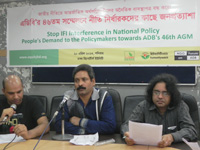 A CSO network called NGO Forum on ADB raises 9 point demand to the Government Delegation of Bangladesh who is joining to the upcoming 46th AGM of ADB to be held in Delhi. Today (Saturday, April 20, 2013) in a press conference held at Dhaka Reporters’ Unity, leaders of the forum along with other CSO organizations declared their position on the eve of the ADB meeting.
A CSO network called NGO Forum on ADB raises 9 point demand to the Government Delegation of Bangladesh who is joining to the upcoming 46th AGM of ADB to be held in Delhi. Today (Saturday, April 20, 2013) in a press conference held at Dhaka Reporters’ Unity, leaders of the forum along with other CSO organizations declared their position on the eve of the ADB meeting.
In the 9 point demand the CSO representatives urged that in the AGM of ADB the Bangladesh government delegation should: 1) urge for ensuring ‘1 country 1 vote’ instead of existing voting percentage based on investment size; 2) urge for ensuring people’s participation and rights during approving any project according to the ADB’s policy and Bangladesh Constitution; 3) ask for making public the information on existing ADB projects and outcomes; 4) protest the blanket denationalization and liberalization strategies; 5) take position against the commercialization of natural resource; 6) deny the pressure on increasing the price of essential services; 7) protest and deny ADB’s intention of credit business using the climate issues; 8) protest imposing the PPP everywhere in development and 9) cancel the immunity given to ADB in 1973.
EquityBD, Humanity Watch and NGO Forum on ADB jointly organized the press conference where the 9 point demands were announced in a written statement which was read out by Mr. Hasan Mehedi, the Chief Executive of Humanity Watch and member of the forum. Others who spoke in the press conference are Syed Aminul Hoque of EquityBD, Rahela Rabbani of Karmajibi Nari, Shamim Arfin of AOSED, Javed Khalid Pasha Joy of Initiative for Right View (IRV), Mahfuzur Rahman Mukul of BELA and Kazi Hafizur Rahman of Swabalambi. Mustaga Kamal Akanda of EquityBD moderated the press conference.
In the written statement the organizers said that though ADB have 67 member countries but only 7 of them including USA and Japan have captured 51% vote and that’s why these 7 countries can take any decision over the rest. This is not an example of democracy. Rather they impose many unethical decisions over the borrowing countries like Bangladesh in a very undemocratic way. As ADB has been given immunity in 1973 by the then President of Bangladesh, it is not possible to bring them under law even if any of their project causes harm to the recipients. This anti-people immunity order should be cancelled.
Zaved Khalid Pasha said, Bangladesh is implementing 263 projects financed by ADB and most of them caused long term damages to the livelihood of the local community and environment. Even according to the ADB’s own evaluation, the Sundarbans Bio-diversity Conservation Project (SBCP) and Khulna-Jessore Drainage Rehabilitation Project (KJDRP) are the examples of their failure projects. Several hundred millions of Taka has been spent with no benefits, though Bangladesh had to shoulder the burden to repay this loan.
Syed Aminul Hoque of EquityBD said, ADB is liable for a huge unemployment in Bangladesh along with increased electricity and fuel price, making farmers dependent on the MNCs through imposing SAP and PRSP in Bangladesh by the blanket privatization of the state-owned industries, privatizing the electricity and power sector, squeezing the public service sectors and promoting the shrimp culture that destructed the ecosystem.
The speakers also urged the government delegation participating in the AGM of ADB should take strong position along with the like minded countries to democratize the ADB governance.
Please Download [Bangla_press] [English_press] [Position paper]









